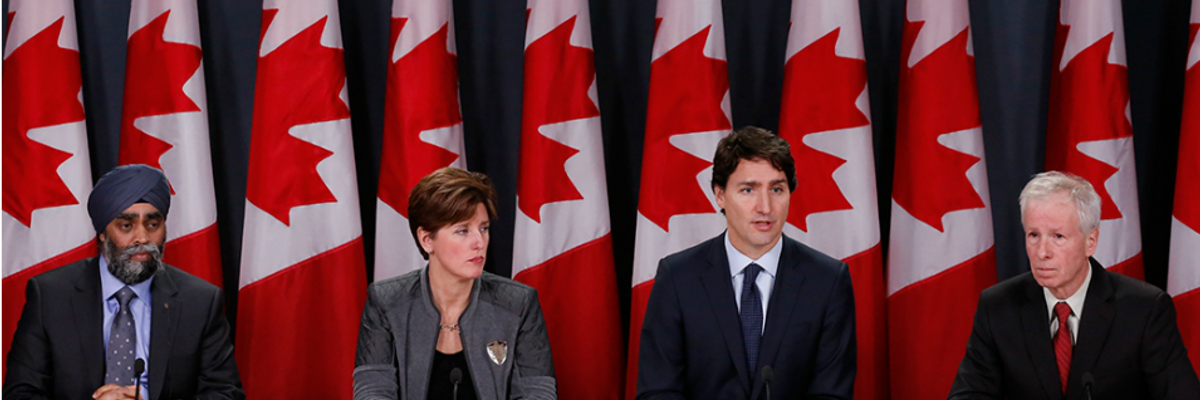Canada will end its bombing campaign in Iraq and Syria this month and refocus its efforts in the fight against the Islamic State (ISIS or ISIL) on supporting long-term stability in the region, Prime Minister Justin Trudeau announced on Monday.
During a press conference Monday night alongside Defense Minister Harjit Sajjan, International Development Minister Marie-Claude Bibeau, and Foreign Affairs Minister Stephane Dion, Trudeau said that ISIS was not a credible threat to civilization and that engaging in "heated, over-the-top rhetoric" against the group would not resolve the conflict.
The announcement comes just a few months after Trudeau took power. He said on his first day in office that he would end Canada's participation in the U.S.-led mission against the militant group.
"We are for what will be effective, not for what will make us feel good to say at any given moment," he said Monday. "The people terrorized by [ISIS] every day don't need our vengeance. They need our help."
The Liberal administration said it would end its air strikes in Iraq and Syria by February 22, although it will keep some surveillance and refueling jets in the region. It will also deploy additional troops to the region to help train Kurdish fighters in northern Iraq, increasing the number of soldiers there to about 200. As CBC News reported:
"The mission that we've engaged is an advise-and-assist mission, and that is exactly what we are going to do," [Trudeau] said. A short while later, from the exact same seat, [Chief of Defense Staff, Gen. Jonathan] Vance was clearer: Yes, Canadian trainers would be marking targets and, yes, there was a chance that they would have to engage the enemy to defend themselves.
"As well, stabilization and counter-terrorism measures and chemical, biological, radiological and nuclear security programming in the region will be enhanced," a statement from the prime minister's office reads.
In addition to its presence on the ground, Canada will contribute more than $1.6 billion over the next three years to "security, stabilization, humanitarian and development assistance," the administration said.
That includes $840 million toward food, water, shelter, health care, and emergency education, which will target the most vulnerable civilians in the crisis, including children and sexual violence survivors, as well as $270 million to rebuild and stabilize infrastructure and employment. After two years, the mission will be reevaluated, the prime minister said.
In ending the bombing campaign, Trudeau is fulfilling one of his key pledges from last year's election. He made reference to that promise in Monday's press release, stating, "In keeping with the mandate the government received from Canadians last fall, the government will focus on training and advising local security forces to take their fight directly to ISIL."
"Our new policy in Iraq, Syria and the surrounding region reflects what Canada is all about: defending our interests alongside our allies, and working constructively with local partners to build real solutions that will last," Trudeau said. "We will work with allies to defeat ISIL and the terrorist threat it represents. At the same time, we will help address the needs of millions of vulnerable people while helping lay the foundations for improved governance, economic growth and longer-term stability."

